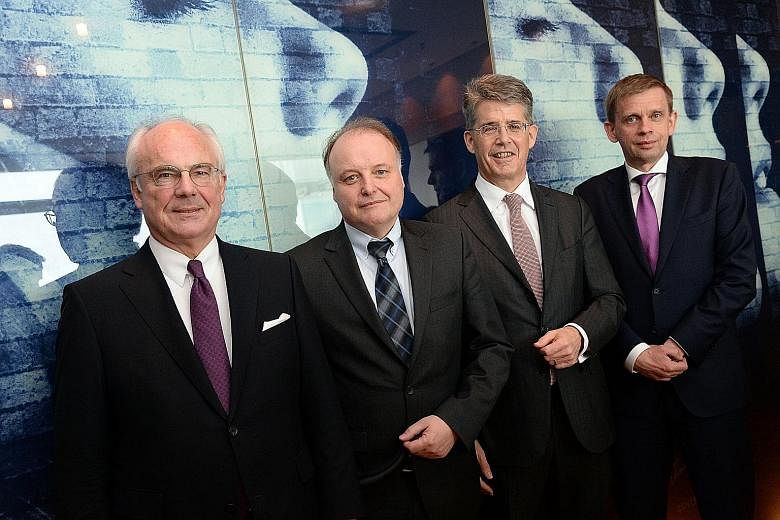Mr Marc Sperschneider, whose factory makes X-rays that can scan car parts and electronic devices for defects, can see Asia is the way to go to expand his business.
But like the bosses of many German family-owned firms, he is also instinctively cautious. His solution when confronted by a largely unfamiliar market in South-east Asia was to first set up a base in Singapore.
That he did in 2012. Early this year, his company, Matrix Technologies, signed a lease for space at the German Centre to house its regional sales and service hub. It will double its staff of five in anticipation of more business opportunities when the Asean Economic Community (AEC) takes effect by the year end.
"There is a lot of untapped opportunities for us in Asean," says Mr Sperschneider, who runs the company with his father.
Matrix is not a big company. It has about 100 employees but its 30 per cent global market share in the €100 million to €150 million (S$150 million to S$225 million) automated X-ray inspection equipment sector makes it an industry leader.
Its other Asian bases are in China and India.
The firm is typical of Germany's famed Mittelstand - small and medium-sized companies (SMEs). These are usually family-run, with revenues of up to €50 million, and collectively contribute 52 per cent to Germany's economic output.
Called Germany's "hidden champions" because they are key players in niche sectors, such as electrical engineering, the Mittelstand comprise most of the 1,500 German companies based in Singapore.
Their numbers have risen over the years and are expected to surge, spurred in part by the growth potential of the AEC, with its market of 600 million people.
"We are getting a lot of inquiries from many German SMEs keen to know technical and safety requirements, such as for medical devices and machinery to be sold to South- east Asian markets," says Mr Dirk Eilers, board member of product certifier TUEV SUED.
The Economic Development Board (EDB) is also doing its bit to encourage the Mittelstand's presence in Singapore. In February, it named four German managers - ABC Gruppe chairman Michael Schaedlich, Mann+Hummel chairman Thomas Fischer, Rohde & Schwarz president Peter Riedel and Pepperl+Fuchs CEO Gunther Kegel - as "economic ambassadors" with a mission to win over SMEs. It plans to appoint four more ambassadors by October.
Mr Riedel, whose firm makes wireless communication equipment, sees his role as a point of contact for companies thinking about setting up operations in Singapore. He says: "For them it is important to talk to other companies about their experiences... why they went to Singapore and how to plan such a step. I have talked to quite a few companies and tried to support them in their planning."
Dr Schaedlich explains that many German SMEs do not have the resources for in-depth country research before venturing abroad.
"They are very careful," says DZ Bank Singapore head Klaus Borig. "It takes them normally quite a number of years, typically three to five years, before they are really convinced and make the decision."
But the signs point to a growing Mittelstand presence in Singapore and the region. Some seek out local partners while those already in Singapore look for ways to expand.
"For example, those which have only a pure sales office or a representative office like to build a production facility here or in neighbouring countries," says Mr Borig. "They very often come to get advice on how to do it best."
Dr Kegel says Singapore is attractive to risk-averse German firms because of the security offered by its legal system and the stable political climate, as well as its infrastructure and well-educated people.
But getting the right people and keeping them are nagging concerns. One hitch is that Mittelstand are not well-known global brands. Potential recruits also prefer to work in Australia, Britain or the US rather than struggle with learning the German language - and no guarantee of a permanent job.
Mr Reinhard Boesl, board member of industrial sensor maker SICK, which started with three people in 1991 in Singapore and now has around 110, says his firm is keen to expand but is finding it hard to hire enough qualified staff - a problem the EDB is tackling. It has started a programme for apprentices to study German and work at the same time in a Mittelstand.
For many German SMEs, Singapore's reputation as a reliable and efficient place for doing business and its proximity and strong ties with its Asian neighbours outweigh these difficulties.
"The biggest challenge in Asia for those not internationally exposed is still culture," says Mr Fischer. "These firms are very German, with very black and white rules."
Dr Schaedlich says Singapore is the logical launching pad into Asia. "Culture is not the biggest challenge in Singapore, which is quite an easy spot to start with when dealing with various other cultures in the region. It is much easier to do it from Singapore than to do it from Germany. That's why Singapore is a good place for a regional hub."

